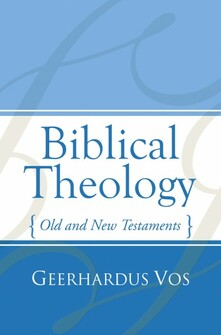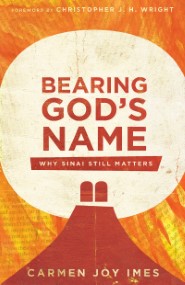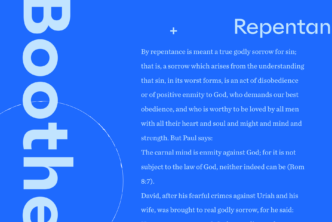What is biblical theology?
There is actually more than valid, useful definition of “biblical theology,” and we’ll share why in a moment—but here’s an answer to help us get started.
Biblical theology is characterized by two distinct but related activities which may be broadly described as analysis and synthesis. The first seeks to reconstruct the individual theologies of the writings or collections of writings of the Bible. … [The second] focuses on the task of synthesis by presenting the theology of particular themes across the whole Bible.1
It will help us to ask several questions about biblical theology:
- Where did biblical theology come from?
- Which biblical theology resources are helpful for beginning, intermediate, and advanced Bible students?
- How can someone study biblical theology in the Logos app?
Where did biblical theology come from?
Matt Miller, former Lutheran product manager for Logos, explains the origin of and reason for the varied definitions of biblical theology:
When I was in my final year in seminary, another student suggested to me that the church needed to focus more on “biblical” theology instead of “systematic” theology. The latter, he argued, promoted the “doctrines” of man rather than the Bible. Having studied the Reformation and twentieth-century theology, I was a bit amused by the false dichotomy. Still, his comments showed how confusing the distinctions between these separate but related fields can be.
Definitions of biblical theology abound, and most of them, understandably, tend to align with one’s views on the nature and role of Scripture in the Christian life. Brevard Childs famously quipped in Biblical Theology in Crisis, “The real question is not whether to do biblical theology, but rather what kind of biblical theology does one have.”
Attempting to provide a constructive and more lucid definition, Anthony Thiselton posits that “biblical theology attempts to use biblical exegesis and interpretation to provide a coherent and constructive account of biblical data.”2
To understand why this discipline has been notoriously difficult to define, we must go back to its origins. Early biblical theology (1750–1930) set out to distinguish between critical-historical questions and Christian doctrine. While those early proponents did not explicitly endorse a conflict between faith and history, that was the effect their work had. Unsurprisingly, early biblical theologies had a tendency to become histories of religion, especially those focused on Old Testament theology.
Later, Walter Eichrodt (1934) and the Biblical Theology Movement (1954–1974) led by Oscar Cullman and Alan Richardson used the biblical data to explain how theological concepts rising out of Scripture’s writings shaped historical faith communities in Judaism and Christianity. BTM stressed the unity and uniqueness of the Bible’s theological vision and the centrality of God’s revelation of himself in Jesus Christ. Critics of BTM, most notably James Barr, argued BTM’s work was biased by a “high view” of Scripture. In some ways it’s a legitimate contention, though one might just as easily point out Barr’s unqualified belief in critical-historical exegesis. The conflict exposed an inherent problem within biblical theology: what kind of biblical theology does one have?
The eventual demise of BTM in the late ‘70s did not spell the end for biblical theology. But it did propel confessional biblical scholars to seek greater nuance between critical history and biblical exegesis. This group included George Eldon Ladd, Gordon Fee, Herman Ridderbos, O. Palmer Robertson, William J. Dumbrell, G. K. Beale, N. T. Wright, Tom Schreiner, D. A. Carson, and many others. The success of their project has changed the academy and the church, allowing us to expand our definition of biblical theology beyond a task-based discipline to an articulation of what it must achieve. Craig Bartholomew provides such a definition:
[B]iblical theology is precisely a contemporary explication of the Rule of Faith, demonstrating its grounding in Scripture and providing invaluable help in reading parts of Scripture within tota Scriptura [all of Scripture].3
Added to Thiselton’s definition, we now have a robust articulation of not only how to do biblical theology, but what it should aim for. The Rule of Faith allows Christians to embrace critical scholarship, explore salient theological themes freely and calls us to scriptural and confessional fidelity.
Biblical theology resources for everyone
The beauty of biblical theology is that there’s something in it for everyone, from the new Christian to the seminary graduate. Below we offer some recommendations for beginners, intermediate students, and advanced students of Scripture.
Your books are better in Logos. Learn more
Biblical theologies for beginners
You don’t have to know everything there is to know about the Bible to dive into biblical theology. In fact, biblical theology is a great way to learn the main themes of Scripture and understand the big picture of God’s revelation through his Word.
Whether you’re interested in studying biblical theology for the first time or want to beef up on the basics, these books can help you get started:

What Is Biblical Theology? A Guide to the Bible’s Story, Symbolism, and Patterns
Regular price: $8.99
From Eden to the New Jerusalem: Exploring God’s Plan For Life On Earth
Regular price: $8.99
Understanding Biblical Theology: A Comparison of Theory and Practice
Regular price: $13.99
Biblical theologies for intermediate study
At the intermediate level of study, there are plenty of books giving a more in-depth overview of biblical theology, but there are also more focused studies on particular theological themes. Bear in mind that you don’t always have to read a book cover to cover to find answers to questions you’re researching.
Here are some great options you might find interesting:
Dominion and Dynasty: A Biblical Theology of the Hebrew Bible (New Studies in Biblical Theology, vol. 15 | NSBT)
Regular price: $19.99
A New Testament Biblical Theology: The Unfolding of the Old Testament in the New
Regular price: $59.99
Another way you can explore biblical theology in greater depth is by going through commentaries that take a biblical theology approach. The Evangelical Biblical Theology Commentary series is an excellent example of this. If you’re not sure where to start, we recommend Charles L. Quarles’s volume on Matthew.
Biblical theologies for advanced study
Where some beginner and intermediate biblical theologies might be big-picture overviews, more advanced biblical theologies often go exceptionally deep into a specific theme in Scripture.
Here are some advanced or academic-level books:
The King in His Beauty: A Biblical Theology of the Old and New Testaments
Regular price: $54.99
Biblical Theology of the Old and New Testaments: Theological Reflection on the Christian Bible
Regular price: $29.99
As a side note, the New Studies in Biblical Theology series has over fifty books that cover over 50 separate themes in Scripture. You can pick up the whole set or stock up on the themes you find most interesting. A few bestsellers:
- The Temple and the Church’s Mission: A Biblical Theology of the Dwelling Place of God by G. K. Beale
- Contagious Holiness: Jesus’ Meals with Sinners by Craig L. Blomberg
- Changed into His Likeness: A Biblical Theology of Personal Transformation by J. Gary Millar
- Who Shall Ascend the Mountain of the Lord?: A Biblical Theology of the Book of Leviticus by L. Michael Morales
How to study biblical theology in the Logos App
With the Logos app, you can easily go from reading a passage to studying the biblical-theological themes woven throughout Scripture. Let’s say you’re reading John 1 and want to slow down on verse 14:
And the Word became flesh and dwelt among us, and we have seen his glory, glory as of the only Son from the Father, full of grace and truth.
From the desktop app, open the Passage Guide from the Guides menu.
Enter John 1:14 in the Passage Guide, and look for the Biblical Theologies section. It may be collapsed, so you’d need to click the arrow next to it. (Pro tip: You can rearrange the sections in the Passage Guide to put them in the order you find most helpful.)
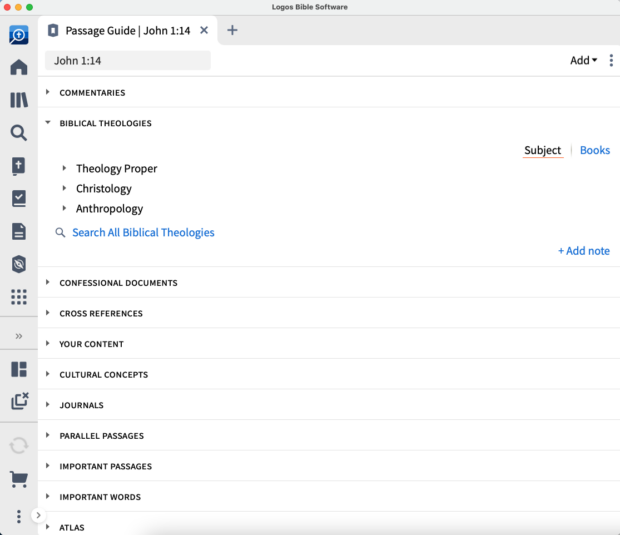
In the Biblical Theologies section, we can see that the main themes of this passage are Theology Proper, Christology, and Anthropology. Clicking into any of these themes opens a list of books in your library with references to John 1:14 within that theme. You can also click Search All Biblical Theologies if you want to see what’s in your library more broadly.
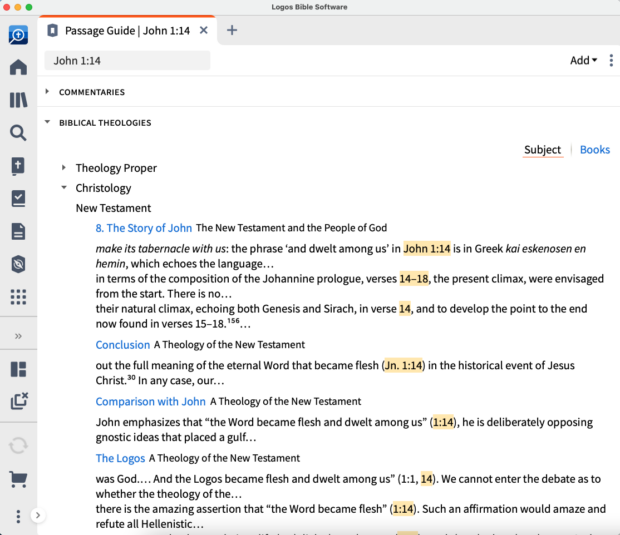
For our purposes, let’s say we’re looking at Christology in John 1:14, so we’ll click there, and the first entry looks promising: it’s from N. T. Wright’s book, The New Testament and the People of God. Here’s just one insight we can gain from looking at John 1:14 through a Christological lens:
There is a logos, a ‘word’, present with the creator from the beginning as his self-expression. This logos comes to make its tabernacle with us: the phrase ‘and dwelt among us’ in John 1:14 is in Greek kai eskenosen en hemin, which echoes the language of Sirach 24:8, 10, with skene being both the Greek for ‘tent’ or ‘tabernacle’ and also, interestingly, an apparent cognate of the Hebrew Shekinah itself. The result is that ‘we have beheld his glory’, the glory of the truly human being, who, like Wisdom in another Jewish book, is the ‘unique’ one, monogenes. Moreover, this logos quietly takes the place not only of Shekinah but also of Torah: the law was given through Moses, while grace and truth came through Jesus Christ. It is important not to add the word ‘but’ to the second clause, as though John were anticipating Marcion and treating Moses as the antithesis of the logos. Equally, it is clear that he is saying: that which Judaism had thought to find in Torah is truly found in Jesus.4
That’s just the tip of the iceberg of what it’s like to study with Logos. You can get started free today, or pick up a package to get a fuller experience of how Logos can help you go deeper in your study of God’s Word.
- B. S. Rosner, “Biblical Theology,” in New Dictionary of Biblical Theology, ed. T. Desmond Alexander and Brian S. Rosner (Downers Grove, IL: InterVarsity Press, 2000), 6.
- Anthony C. Thiselton, “Biblical Theology,” The Thiselton Companion to Christian Theology (Grand Rapids, MI; Cambridge: Eerdmans, 2015), 147.
- Craig G. Bartholomew, Introducing Biblical Hermeneutics: A Comprehensive Framework for Hearing God in Scripture (Grand Rapids, MI: Baker Academic, 2015), 59.
- N. T. Wright, The New Testament and the People of God, Christian Origins and the Question of God (London: Society for Promoting Christian Knowledge, 1992), 414.



